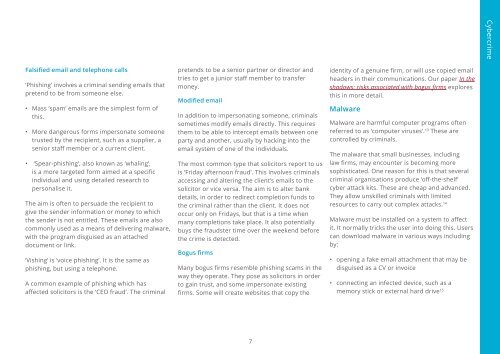IT security
it-security
it-security
You also want an ePaper? Increase the reach of your titles
YUMPU automatically turns print PDFs into web optimized ePapers that Google loves.
Cybercrime<br />
Falsified email and telephone calls<br />
‘Phishing’ involves a criminal sending emails that<br />
pretend to be from someone else.<br />
• Mass ‘spam’ emails are the simplest form of<br />
this.<br />
• More dangerous forms impersonate someone<br />
trusted by the recipient, such as a supplier, a<br />
senior staff member or a current client.<br />
• ‘Spear-phishing’, also known as ‘whaling’,<br />
is a more targeted form aimed at a specific<br />
individual and using detailed research to<br />
personalise it.<br />
The aim is often to persuade the recipient to<br />
give the sender information or money to which<br />
the sender is not entitled. These emails are also<br />
commonly used as a means of delivering malware,<br />
with the program disguised as an attached<br />
document or link.<br />
‘Vishing’ is ‘voice phishing’. It is the same as<br />
phishing, but using a telephone.<br />
A common example of phishing which has<br />
affected solicitors is the ‘CEO fraud’. The criminal<br />
pretends to be a senior partner or director and<br />
tries to get a junior staff member to transfer<br />
money.<br />
Modified email<br />
In addition to impersonating someone, criminals<br />
sometimes modify emails directly. This requires<br />
them to be able to intercept emails between one<br />
party and another, usually by hacking into the<br />
email system of one of the individuals.<br />
The most common type that solicitors report to us<br />
is ‘Friday afternoon fraud’. This involves criminals<br />
accessing and altering the client’s emails to the<br />
solicitor or vice versa. The aim is to alter bank<br />
details, in order to redirect completion funds to<br />
the criminal rather than the client. It does not<br />
occur only on Fridays, but that is a time when<br />
many completions take place. It also potentially<br />
buys the fraudster time over the weekend before<br />
the crime is detected.<br />
Bogus firms<br />
Many bogus firms resemble phishing scams in the<br />
way they operate. They pose as solicitors in order<br />
to gain trust, and some impersonate existing<br />
firms. Some will create websites that copy the<br />
identity of a genuine firm, or will use copied email<br />
headers in their communications. Our paper In the<br />
shadows: risks associated with bogus firms explores<br />
this in more detail.<br />
Malware<br />
Malware are harmful computer programs often<br />
referred to as ‘computer viruses’. 13 These are<br />
controlled by criminals.<br />
The malware that small businesses, including<br />
law firms, may encounter is becoming more<br />
sophisticated. One reason for this is that several<br />
criminal organisations produce ‘off-the-shelf’<br />
cyber attack kits. These are cheap and advanced.<br />
They allow unskilled criminals with limited<br />
resources to carry out complex attacks. 14<br />
Malware must be installed on a system to affect<br />
it. It normally tricks the user into doing this. Users<br />
can download malware in various ways including<br />
by:<br />
• opening a fake email attachment that may be<br />
disguised as a CV or invoice<br />
• connecting an infected device, such as a<br />
memory stick or external hard drive 15<br />
7


